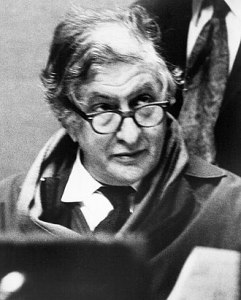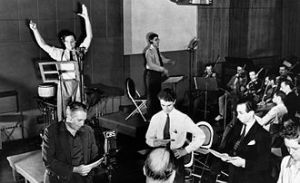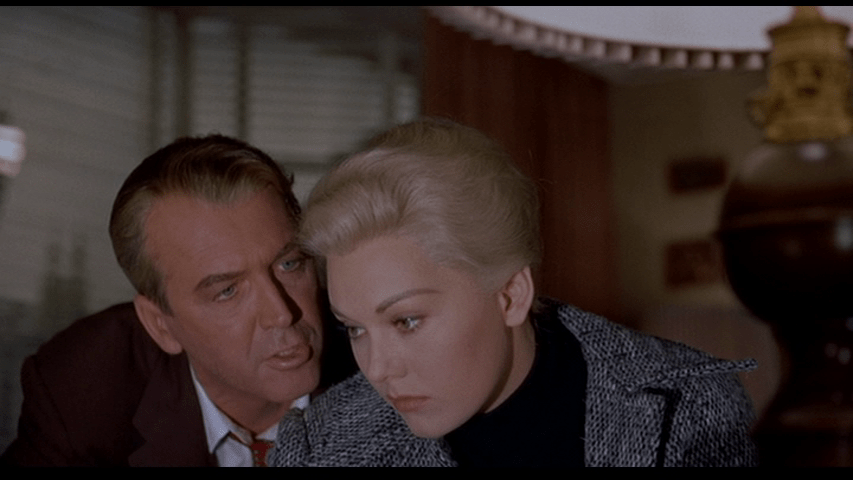Vertigo, 1958, Paramount Pictures. Starring James Stewart, Kim Novak. Directed by Alfred Hitchcock. Technicolor, 128 minutes.
After a rooftop chase in which his partner fell to his death while trying to save him, Scottie (James Stewart) retires from the police force, suffering from vertigo, a dizzying fear of heights. A friend from college, Gavin Elster (Tom Helmore), then hires him to follow his wife, Madeleine (Kim Novak), a beautiful blond with suicidal thoughts. Gavin believes she is possessed by the spirit of her great-grandmother, who committed suicide.
While Scottie is following Madeleine the two fall in love. It is while visiting an old mission that Madeleine suddenly runs into the church and up the bell tower. Scottie, gripped with fear by his vertigo, can’t follow her and sees her jump to her death. Soon after, Scottie meets another woman, Judy (also played by Kim Novak), and he is struck by her remarkable resemblance to Madeleine. They begin a romance, with Scottie attempting to mold Judy into Madeleine with simple changes such as a her hair color. But harrowing events lie ahead.
 The score for Vertigo was written by the renowned Bernard Herrmann, best known for his work in Hitchcock films. It is his score for Vertigo that most often receives special recognition for its effectiveness in highlighting the suspense and tragic elements of the story. This was due in part to skills Herrmann learned while working for CBS radio.
The score for Vertigo was written by the renowned Bernard Herrmann, best known for his work in Hitchcock films. It is his score for Vertigo that most often receives special recognition for its effectiveness in highlighting the suspense and tragic elements of the story. This was due in part to skills Herrmann learned while working for CBS radio.
According to a September 21, 2018 article titled “The Music of Suspense: Herrmann’s Vertigo Suite,” published by the Houston Symphony, “In radio, cues lasting only a few seconds were often necessary to create the illusion of movement in space or time between the scenes of a radio play, and Herrmann adapted this technique to cinema to great effect. Though he also wrote many unforgettable extended sequences of film music, his sensitive, less-is-more approach and respect for dialogue, sound effects and the power of silence would make him an ideal collaborator for the master of suspense, Alfred Hitchcock.”
Bernard Herrmann’s love of music began early in his childhood in New York City. Encouraged by his father, he soon began composing original compositions. He attended both NYU and Juilliard, and at the age of 20 he founded his own orchestra, New Chamber Orchestra of New York. His work was popular and through it he quickly became acquainted with the top musical talents in New York of the time.
 In 1934, he joined the Columbia Broadcasting System (CBS) as a staff conductor. It was through his work there that he got to know a young Orson Welles. In 1940 Welles invited him to write the score for Citizen Kane, for which he was nominated for an Academy Award. The following year he won an Oscar for his score to The Devil and Daniel Webster. From then on Herrmann became one of the most in-demand of Hollywood’s film composers. Although he collaborated with many directors, Herrmann is best remembered for his work with Hitchcock.
In 1934, he joined the Columbia Broadcasting System (CBS) as a staff conductor. It was through his work there that he got to know a young Orson Welles. In 1940 Welles invited him to write the score for Citizen Kane, for which he was nominated for an Academy Award. The following year he won an Oscar for his score to The Devil and Daniel Webster. From then on Herrmann became one of the most in-demand of Hollywood’s film composers. Although he collaborated with many directors, Herrmann is best remembered for his work with Hitchcock.
Sadly, Herrmann was overlooked by the Academy Awards for Vertigo. The film received only two Oscar nominations, for Best Art Direction and Best Sound, but won none.
Although received with mixed reviews at the time of its release, Vertigo has since gained recognition as one of Hitchcock’s finest. The score by Bernard Herrmann has also gained renown and is frequently played by symphonies around the world. Vertigo is a must-see for all classic movie fans.
This post is my contribution to the Bernard Herrmann Blogathon, sponsored by The Classic Movie Muse.

[…] For a Reason | Vertigo […]
LikeLiked by 1 person
Herrmann’s score for Vertigo being overlooked by the Academy shouldn’t surprise us, and yet it does. Did they feel the trophy for The Devil and Daniel Webster was enough?
LikeLiked by 1 person
I would hope not, but who knows!
LikeLiked by 1 person
I love the quote you included from the Houston Symphony article, Belinda. That’s something I never noticed before delving deeper into Herrmann – his utilization of short musical phrases. It makes so much sense, but isn’t readily apparent when thinking about film music.
Thanks so much for contributing to my blogathon, Belinda!! We couldn’t have done it without Vertigo 🙂
LikeLiked by 1 person
Glad to contribute. I learned a lot!
LikeLiked by 2 people
I still have those mixed feelings, due to the inplausibility of the story. I was really disappointed by the the second act in that respect.
LikeLiked by 2 people
“Logic is dull.” 😉
LikeLiked by 4 people
My all-time favorite score. It is deliciously brooding, and gorgeously romantic. It also has a hint of melancholia. It’s just perfect. Thanks for highlighting it! 🙂
LikeLiked by 3 people
Thank you for connecting some biographical dots for me through this post. Before joining this blogathon, I knew next to nothing about Bernard Hermann – and as illuminating as my own research (which focused solely on his score for Psycho) and the other posts I’ve read so far have been, I appreciate how you laid out a general timeline of his education and early career. It makes total sense that his background in radio would influence his film compositions!
I’m glad I participated in this blogathon (my very first, actually!), as it’s introduced me not only to this brilliant composer whose work is totally new to me, but also to more bloggers along the way. 🙂 I enjoyed reading your post. If you haven’t yet, I’d love for you to check out my entry on Psycho. Thanks! 🙂
LikeLiked by 1 person
I will be happy to check out your entry! I’m glad you enjoyed my post and more importantly, that you found so many benefits in participating in the blogathon!
LikeLiked by 2 people
A new classic movie review sweet spot! Great review. I am digging into the others.
LikeLiked by 1 person
Thank you! That is high praise and I appreciate it!
LikeLiked by 1 person
You’re welcome, Belinda. It pays to dig down into WP!
LikeLiked by 1 person